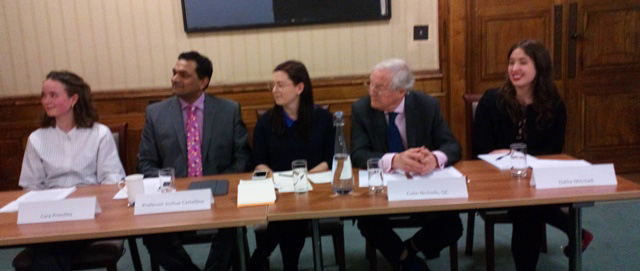 London's Senate House: The Commonwealth and human rights (l-r) Cara Priestly, Professor Joshua Castellino, Cassandra Söderström, Colin Nicholls QC and Dailia Mitchell.
London's Senate House: The Commonwealth and human rights (l-r) Cara Priestly, Professor Joshua Castellino, Cassandra Söderström, Colin Nicholls QC and Dailia Mitchell.
“While the Commonwealth may have at one time been committed to human rights…it is now nothing more than [public relations] fluff.”
This was Joshua Castellino’s critical verdict on the modern Commonwealth. The debate took place on the evening of Tuesday 6 March, sponsored by the University of London, School of Advanced Study’s Human Rights Consortium.
A Professor of Law and Dean of the School of Law and Business School at Middlesex University, Joshua was proposing the motion: “This House thinks that Commonwealth commitments for human rights are just for public relations.” The Commonwealth is reluctant to utilize a human rights rhetoric, Joshua argued, rather the Commonwealth prefers not to participate in the ‘naming and shaming’ game for fear that their actions will trigger a dialogue about state sovereignty and the Commonwealth’s imperial history.
Robustly opposing the motion was Colin Nicholls, QC, honorary life president of the Commonwealth Lawyers’ Association. Colin, who has a practice covering a plethora of topics including war crimes, bribery and human rights, spoke of the importance of the Commonwealth being a “family of states” dedicated to pursuing meaningful dialogue. While the Commonwealth may not be as effective as one wishes, Colin argued, the “slow burn” benefits of the Commonwealth in bringing diverse countries to the discussion table is clearly visible as seen by the Harare Declaration. Colin concluded by stating, “don’t throw the baby out with the bathwater.”
Seconding the motion was Cara Priestley, a current MA Human Rights student at the School of Advanced Study and who has undertaken research with the International State Crime Initiative. She condemned the Commonwealth for its apparent mismatch between words and deeds, stating that while the Commonwealth might condemn a state for certain human rights violations, it is “business as usual on the ground.”
Dallia Mitchell, a current MA Human Rights student at the School of Advanced Study and who is currently working for the IRCC (Immigration, Refugee and Citizenship Canada) at the High Commission of Canada to the UK, was the second opposing the motion. Dallia acknowledged that the Commonwealth is not perfect but argued that it has done substantial work in addressing human rights issues as seen by the Commonwealth efforts combatting child marriage in the Kigali Declaration.
The debate harnessed a vibrant discussion among the audience once it was opened up to the floor. Dr. Corinne Lennox, Senior Lecturer in Human Rights at the School of Advanced Study, argued that while the Commonwealth does have the potential to effectively address human rights issues, the Charter does not include LGBT rights in any form nor does the Commonwealth meetings allow for dialogue with civil society.
After calling for concluding speeches, Cassandra Söderström, presiding, took a vote of the twenty or so students present, and the consensus was in favor of the motion. All were welcomed to a wine reception afterwards, sponsored by The Round Table: the Commonwealth Journal of International Affairs.
The School of Advanced Study debate was part of a series of UK-wide Commonwealth debates organized by The Round Table in advance of the Commonwealth Summit, to be held in London in April.
McKenna Jacquemet is currently an intern with the Human Rights Consortium and is working towards earning her MA in Understanding and Securing Human Rights at the School of Advanced Study, University of London.



